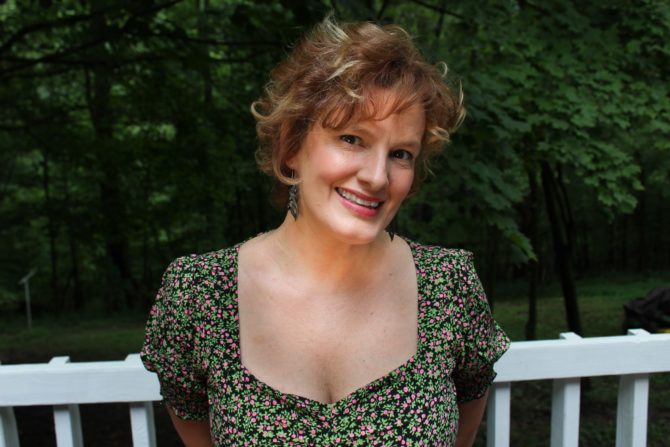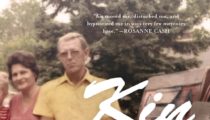It’s six a.m. on an April morning. I sit at…

In Conversation: Shawna Kay Rodenberg
There’s a certain amount of defiance hovering between Shawna Kay Rodenberg’s words as she discusses Kin, her debut memoir slated for publication by Bloomsbury in June—and after spending time with her searching, resilient book, it is easy to understand why. Kin recounts her family’s exile from their native Eastern Kentucky to rural Minnesota, where Rodenberg spent much of her childhood as a member of The Body, a Christian fundamentalist End Times commune that preached a strict, patriarchal gospel of denial and austerity. When the family abandoned the group to return to Appalachia, they were left to reckon with the effects of The Body on their family and to confront the fraught, sometimes violent dynamics playing out within the confines of their home—the legacy of Vietnam and generations of hardship and abuse. The volatile relationship between Rodenberg and her father occupies the heart of the memoir, and it is her search for empathy and understanding—of her father, of her family, of Appalachia, of herself—that drives the fractured narrative.
“My family’s story is epic,” Rodenberg declared in a recent conversation with Appalachian Review, “and I’m proud of who we are and everything we’ve survived.”
■■■
JASON KYLE HOWARD: Kin recounts how, when you were a child, your family left Eastern Kentucky to join an End Times religious community in rural Minnesota—and the lingering effects of that experience after your family eventually left. Where did the book begin for you? How did you come to write it?
SHAWNA KAY RODENBERG: My dear friend and mentor, Mark Wunderlich, whom I met when I was studying poetry as an MFA candidate at the Bennington Writing Seminars, suggested that some of my poems were bogged down by too much narrative burden, and that maybe I should write a memoir, which was the absolute last thing I ever wanted to do. I had chosen to study poetry for many reasons, but most of all I think because of its inscrutable and mysterious nature, which felt like a kind of protective veil one could hide behind, if she wanted to. I think many writers become writers because they long to be known from a safe distance, and I know that’s true for me. “Just write it like no one will ever read it,” Mark said, “like you’re writing something for your kids to read after you’re gone.” A year and a half later I had what I thought might be a prologue, which I showed to another professor at Bennington, Ben Anastas, who teaches creative nonfiction, and like Mark, he believed in the book right away, long before I did, and helped me machete my way through the high weeds of the first few chapters until I could see a possible path.
JKH: A major focus of the book is the fear and violence that existed inside your home and was centered on your father. At one point you describe his decision to not become a coal miner in Eastern Kentucky: “He said the men there lived most of their lives underground, and that it hardened them. He had tried to make a different kind of life.” This passage seems to be symbolic of something beyond his career path. What else was he running from?
SKR: My dad rarely talked about his dad and the mines, so when he did, I paid especially close attention and decided to include a few of those moments in Kin because I believe they point to a fairly universal experience. I’m speaking about the way my family and most families in marginalized communities and regions become preoccupied with the effort required to bear up beneath heavy traumatic lineages and psychic burdens, the struggle to carry on from whatever place in the generational relay race you’re passed the family baton. From an early age, I sensed that the conflict in my family was an old one that existed long before I made my way into the world. I also sensed that many of the families around mine bore the same or heavier burdens—sometimes I witnessed those burdens firsthand. To his credit, my dad was always extraordinarily open with me about the ways his burdens affected our relationship. Later, as an adult, I was humbled and pained to find that my burdens affected my relationships with my own children, too. The thing is, every generation does a little better, because each learns from the mistakes of the previous one and starts a little fresher and further along in the relay race. And, though I wouldn’t want to speak for my dad, since only he can truly know where he was and is coming from, I think we’re all only ever running from ourselves. At least, that’s true for me.
JKH: In the prologue you write, “I know from experience that the price of letting your version of a story exist anywhere outside your own head is that the moment you do it’s no longer your version but public property, subject to scrutiny and denial, and impossible to control.” A couple of things strike me about that passage. First, you are acknowledging the inherent subjectivity of memoir—that Kin is your truth, “your version of a story” as only you can tell it. Were you aware of when your memory of an event or situation didn’t align with those of others? If so, how did you handle approaching that material?
SKR: When you grow up in a storytelling family like I did, you notice right away that some stories overlap, and that different storytellers remember the details of events and the characteristics of people differently, sometimes in ways that seem completely contradictory. This might be because of the way they were feeling on any given day, or because they weren’t as invested in an event and didn’t sense its significance at the time. It might be because of water under the generational bridge, so to speak, which means biases and prejudices, that we always feel more loyalty toward some family members than others. Often, we’re distracted by our own personal drama, so we miss things, or we’re chicken about conflict, so we make ourselves scarce whenever there is one. Writing a memoir forces you to interrogate your memory, but also to confront how much you don’t remember. It reveals how many different versions of his/her/their life anyone could write, and how often the psyche, especially under duress, can’t resist filling in the blanks. I would hope that any loved one whose versions of our shared experiences differ from my own would give me the benefit of the doubt, believing that my heart was in the right place and I worked to be honest and fair in my treatment of everyone whose stories overlapped with and altered my own. My family’s story is epic, and I’m proud of who we are and everything we’ve survived. I believe we deserve our place in American literature, that our story is worth telling and reading and reflecting on. I hope that belief is apparent to anyone who reads Kin.
JKH: As a follow-up, the memoir goes to some tough places—not only about your family, but also about the region, particularly the streak of machismo that runs through Appalachia and is sometimes aggressive and violent. Are you nervous about how the book will be received by your family and community? How have you prepared yourself?
SKR: I think what Appalachia is working out is less a streak of machismo and more a foundational matrix of Bible-based patriarchy—which is also true for the country-at-large as is evidenced by the political turmoil of the last several years. Patriarchy might be more visible in Appalachia, where, for example, women might fix their husbands’ plates before they eat, but we know that household chores and child rearing fall disproportionately to women throughout America, even in households where women are the primary breadwinners. Truly, as my book details, I’ve never been good at submitting to patriarchy, and of course, that always meant conflict, though I want to be clear that I don’t think the problem is men (because patriarchy actually stinks for them, too) but a terrible imbalance of power which I refuse to acknowledge as sustainable or healthy. All of this is to say that from the very first days of writing Kin, I knew there would be backlash, because it’s only an extension, the latest iteration of the fight I, and I believe many other American women, were born fighting. I choose to believe that any backlash is only confirmation of the book’s value in that fight, that it’s doing good things in the world.
JKH: Religious fundamentalism, poverty, abuse and misogyny exist everywhere, but they are often applied to Appalachia as stereotypes. As a memoirist, do you think you can write about those issues without contributing to stereotypical perceptions of the region?
SKR: This question worried me to death as I was writing Kin. First, I think it’s important to remember, if only for sanity’s sake, that my primary task was to tell my own story, not to represent the whole of Appalachia and the 25 million people who live there, each with a story as unique and as common as my own. And, secondly, I think it’s important to say that religious fundamentalism, poverty, abuse, and misogyny are not Appalachian traits, but the inevitable products of late-stage extractive capitalism, underregulated commercial greed, abandonment by corrupt governments, wobbly, dilapidated infrastructures, and exploitative, bootstrap theologies. So, since I’ve been given a voice that carries a bit, it’s my responsibility to be honest about how hard it can be to grow up in a place that might be one of the most dramatic, visible examples of the failures of all those outdated modes of governance. For better or worse, America’s industrial development was fueled by coal extracted from my parents’, grandparents’, and great-grandparents’ land. For better or worse, coal fed the engines of American expansion. Yes, coal as an industry is over, but coal is more than industry in Appalachia; it’s identity, too, and it has to be replaced with something. It’s politically irresponsible to leave an entire region hanging for decades just because there’s nothing else they have that you want. And pretending that everything is okay lets the wrong people off the hook.
JKH: One thing that struck me both as I was reading the book and then after I finished it was how, after recounting numerous instances of emotionally and physically violent behavior from your father—and the lack of determined intervention from your mother—you managed to find a reservoir of empathy for both of them and for other family members. Where did that come from? Was that impulse present on the page from the beginning, or was it something you had to work towards?
SKR: One of my earliest memories is of going to a drive-in movie called Savannah Smiles, a cheesy little tearjerker about some criminals who kidnap a little girl for ransom but come to love her, give her back to her parents, and face going to jail. I cried so hard for days after seeing that movie that my mom was worried about me, mostly because I couldn’t stand that the kidnappers wouldn’t be able to see the little girl again, that the world didn’t work that way because nobody cared that loving someone had changed them for the better, and I’ve really always been that way. Sometimes it has meant that people assume I’m not very smart, because I value mercy over justice, so I let things go and try to understand and see the best in people. Maybe because I’ve needed so much of it, I don’t want to live in a world where mercy isn’t the driving force. Nick Flynn’s Another Bullshit Night in Suck City was the first merciful memoir I read and thought, primarily because of his loving treatment of his father, “Maybe I could bear writing my story down.”
JKH: I’m always deeply intrigued by how books are structured and how those choices can be connected to themes and meaning. Kin moves back and forth in time, sometimes alternating in focus on different characters. How did you arrive at this structure, and how do you think it contributes to the book’s meaning?
SKR: At first, I thought I would write the chapters focused on my own story in present tense, and the family stories in past tense, but about halfway through the project I realized that wasn’t necessary, and that in fact I liked the effect of blending my stories and the stories of the women who came before me, who shared so many of the same experiences coming of age in Eastern Kentucky. In the earliest moments of the book, I knew that I wanted the first half of Kin, the stranger-in-a-strange-land chapters, to be annotated and contextualized by stories my mother shared with me dozens of times, but once I made it to the second part of the book and our return to Letcher County, it became clear that the remainder of my story had to parallel my dad’s. As teenagers, we both had fraught relationships with our fathers. We both rebelled. We both suffered, sometimes from without and sometimes within. And, we left. Honestly, the inclusion of family stories that shaped my own felt more like an ethical decision than a stylistic one. I didn’t see any other way to be fair and truthful.
JKH: So much of the harmful behavior you write about is centered on religion and misogyny—and how the two can be intertwined. You write about how The Body subjugated women, how you were abused by a member of the community, how your family made hard sacrifices to remain members. How, even after your family left, the influence of The Body remained. I’m thinking of how you hid rock cassette tapes from your dad and you were even the focus of an exorcism. Yet you also describe the community as a place where solidarity and tenderness could exist, particularly among the women. This left me wondering where you stand with religion and belief today.
SKR: Well, technically I’m a Catholic, because I converted when I remarried in 2000. It seemed such a gorgeous religion to me, though my husband, having grown up in it, is fairly ambivalent. But, right away, I loved all the sacramentals that evangelicals deem idolatrous—the statuary, stained glass, and candles, the incense and the practiced gesturing, and as someone who spent hours at a time in church conventions and revivals and Bible studies, I find it kind of endearing when Catholics complain about an hour-long Mass. Because I’m a progressive feminist who believes in reproductive freedom and sexual expression, I do struggle with parts of the doctrine, especially the supernatural bits, the demons and miracles, but sometimes I just like the feeling of being in church. I think religion will always be an inclination of mine and the lens through which I view most of the American experience. I follow fundamentalist Instagrammers, bloggers, and conservative stay-at-home homeschooling mothers on YouTube, mostly I think because I like knowing what they’re all up to, but sometimes because, admittedly, I find the language of the church as comforting as a weighted blanket. I have these periodic, intermittent obsessive periods with new religions, philosophies, even health and fitness. Ascetism is not an uncomfortable challenge for me, and I can turn literally anything into a religious practice.
JKH: Any memoir coming out today that is centered on Appalachia has to reckon with the spectre of Hillbilly Elegy, which was not received well among the Appalachian literary community due to a number of factors, including a lack of nuance and sweeping generalizations that were made about the region. Did that book, and the response to it, affect how you approached Kin?
SKR: I felt a little self-conscious about my primary issues with Vance’s book, because I wasn’t nearly as bothered that it was largely “negative” as I was that it was didactic, politically motivated, and easy. I have been scared that people might compare my book with Hillbilly Elegy because what I write doesn’t always paint the most flattering picture. But, flattery is, by definition, insincere and deceitful, and I hope my readers will see that I very sincerely love and feel loyalty to the Kentucky mountains and the people who live there, the true beauty of both. Sadly, the thinly-veiled conservative bias of Vance’s book predictably shifted the blame for Appalachia’s struggles (poverty, drug abuse) onto the wrong shoulders. On the other hand, it did prime the pump for a greater Appalachian presence in mainstream American book culture, and it also taught many of my progressive, writerly, coastal-born friends a good lesson, since many of them initially loved it, revealing a great deal about their own naïve, neoliberal politics and shamefully limited understanding of rural America.
JKH: How were you changed by writing Kin?
SKR: That’s a long list. Taking control of the narrative of my lived life, recreating the scenes that seemed most relevant and omitting those that weren’t, or that I simply didn’t want to share, empowered me in a way I hadn’t anticipated. Telling the truth so publicly about who I am and what I believe has been liberating but also so terrifying that I’m glad I didn’t realize what I was tackling when I started. Before writing Kin I thought I knew something about the personal cost of memoir, but I was clueless about the courage and endurance required to finish one. Following my younger selves (and my father’s and mother’s and grandmothers’) through some of the darkest ravines of our shared story helped me love myself and my family, genuinely so, more than I thought possible. My mother died in October of 2018, and the solid, unyielding chore of the book carried me through the last years of her illness, her death, and the darkest moments of my grief in the ensuing years. I spent more than five years writing Kin, more than a decade if you count the narrative poems that would eventually become memoir chapters, so the process never really felt cathartic, but the mindful preservation of my own history has given me a sense at times of having been made whole again, or of things being “set to rights,” as my mom used to say. Mostly, I’m just grateful every day that I get to be a writer, which feels like a dream. ■



